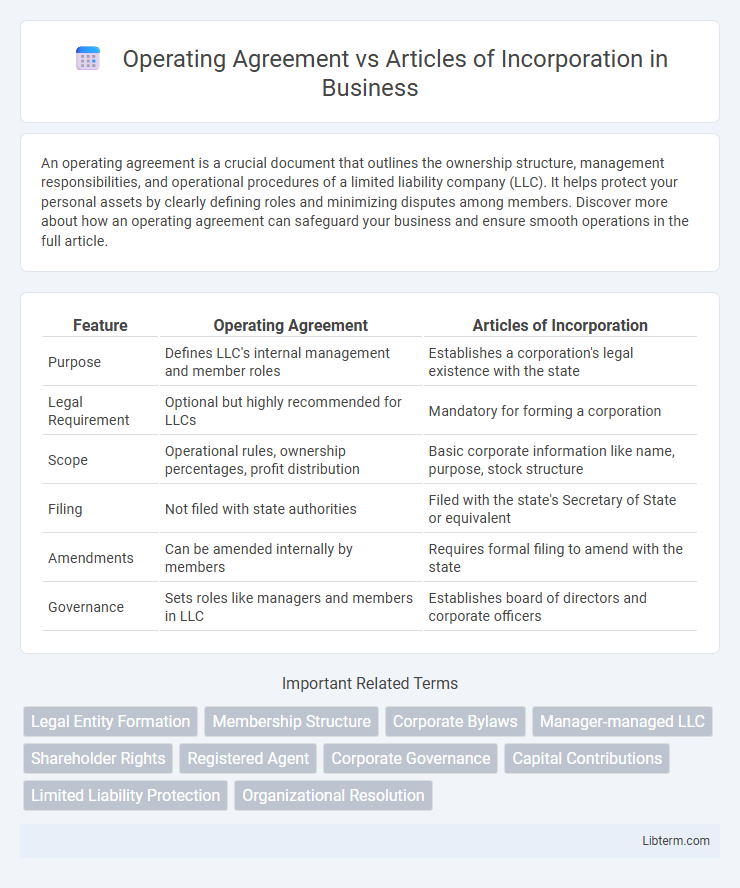An operating agreement is a crucial document that outlines the ownership structure, management responsibilities, and operational procedures of a limited liability company (LLC). It helps protect your personal assets by clearly defining roles and minimizing disputes among members. Discover more about how an operating agreement can safeguard your business and ensure smooth operations in the full article.
Table of Comparison
| Feature | Operating Agreement | Articles of Incorporation |
|---|---|---|
| Purpose | Defines LLC's internal management and member roles | Establishes a corporation's legal existence with the state |
| Legal Requirement | Optional but highly recommended for LLCs | Mandatory for forming a corporation |
| Scope | Operational rules, ownership percentages, profit distribution | Basic corporate information like name, purpose, stock structure |
| Filing | Not filed with state authorities | Filed with the state's Secretary of State or equivalent |
| Amendments | Can be amended internally by members | Requires formal filing to amend with the state |
| Governance | Sets roles like managers and members in LLC | Establishes board of directors and corporate officers |
Introduction: Understanding Key Business Documents
Operating Agreements define the structure, management, and ownership of an LLC, ensuring clarity among members. Articles of Incorporation establish a corporation's legal existence, outlining its fundamental details such as name, purpose, and stock information. Both documents are critical for legal compliance and operational clarity in business formation.
Defining Operating Agreements
Operating Agreements are internal documents that outline the management structure, roles, and responsibilities within a limited liability company (LLC). They define member duties, voting rights, profit distribution, and procedures for adding or removing members, ensuring clear governance and reducing potential conflicts. Unlike Articles of Incorporation, which establish a corporation's legal existence, Operating Agreements focus on the operational rules and agreements among LLC members.
What Are Articles of Incorporation?
Articles of Incorporation, also known as a Certificate of Incorporation or Corporate Charter, is a legal document filed with the state government to officially establish a corporation. This document outlines essential information such as the corporation's name, purpose, registered agent, stock structure, and the names of the incorporators. Filing Articles of Incorporation is a mandatory step to legally form a corporation and gain recognition as a separate legal entity.
Purpose and Legal Significance
Operating Agreements establish the internal management structure and operating procedures of an LLC, defining member roles, voting rights, and profit distribution. Articles of Incorporation serve as a foundational legal document filed with the state to formally create a corporation, outlining the company's purpose, authorized shares, and registered agent. The Operating Agreement governs day-to-day operations and member relationships, while the Articles of Incorporation primarily establish the corporation's legal existence and compliance with state law.
Structural Differences Explained
Operating Agreements define the management structure, roles, and responsibilities within an LLC, emphasizing internal governance and member relations. Articles of Incorporation serve as a foundational document filed with the state to legally establish a corporation, outlining essential details like company name, purpose, and share structure. The primary structural difference lies in the Operating Agreement's focus on internal operational rules versus the Articles of Incorporation's function as a public filing that creates the corporate entity.
Content Comparison: What’s Included?
Operating Agreements outline the internal management structure, member roles, profit distribution, and operational procedures of an LLC, emphasizing flexibility and member-specific governance. Articles of Incorporation provide the foundational framework for a corporation, including the company name, registered agent, stock structure, and purpose, establishing its legal existence with state authorities. While Operating Agreements focus on internal rules tailored to members, Articles of Incorporation deliver the essential statutory information required for corporate formation and public record.
State Requirements and Compliance
Operating Agreements are state-mandated documents primarily for LLCs, outlining management structure, member roles, and operational procedures to ensure compliance with state laws. Articles of Incorporation are required by state government agencies to legally establish corporations, specifying corporate name, purpose, registered agent, and stock information. State requirements vary, with some states mandating filing Articles of Incorporation for corporations but not requiring Operating Agreements for LLCs, although having both enhances legal protection and regulatory adherence.
Which Businesses Need Each Document?
Operating agreements are essential for LLCs to outline member roles, responsibilities, and management structure, providing internal governance and protecting limited liability status. Articles of incorporation are mandatory for corporations, serving as a public record that establishes the company's existence and includes details like the corporate name, purpose, and stock information. Sole proprietorships typically do not require either document, while partnerships may adopt operating agreements for clarity but are not governed by articles of incorporation.
Impact on Business Operations and Ownership
Operating Agreements define the management structure, roles, and responsibilities of LLC members, directly impacting daily business operations and decision-making processes. Articles of Incorporation establish the legal existence of a corporation and outline its basic governance, including the issuance of stock and board of directors' powers, which influence ownership distribution and corporate authority. The Operating Agreement provides flexibility in business operations, while Articles of Incorporation formalize ownership rights and regulatory compliance, both critical for defining control and operational dynamics.
Choosing the Right Document for Your Entity
Choosing between an Operating Agreement and Articles of Incorporation depends on your business structure and legal requirements. An Operating Agreement is essential for LLCs to outline member roles and operational procedures, while Articles of Incorporation are mandatory for corporations to establish the company's existence and governance framework. Understanding the specific needs of your entity type ensures compliance and effective management.
Operating Agreement Infographic

 libterm.com
libterm.com